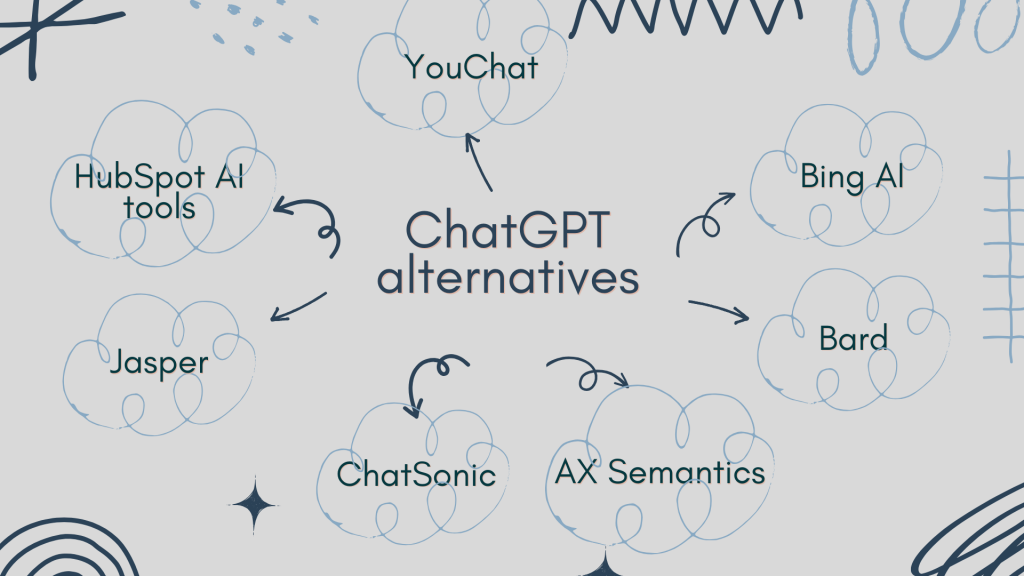Recently, ChatGPT has garnered significant popularity as a business tool, with many businesses incorporating it for tasks such as automating customer support and providing personalized product recommendations. Despite its widespread use, it’s important to note that ChatGPT isn’t the sole AI tool in the market.
Let’s explore alternatives to ChatGPT that businesses can leverage to streamline their ecommerce operations.
What is OpenAI ChatGPT (OpenAI GPT)?
OpenAI ChatGPT, often called ChatGPT or OpenAI GPT, is a highly advanced language model developed by OpenAI, a renowned research laboratory in artificial intelligence. Picture it as a super-smart language wizard. It’s built on the GPT (Generative Pre-trained Transformer) architecture—a sophisticated way computers understand and generate human-like language.
Before launch, ChatGPT went through a massive training phase and learned tons of stuff from various texts. Today, it helps it understand grammar, facts, and even how humans talk and think. This pre-training is like giving it a huge library of language knowledge.
The special thing about ChatGPT is that it’s great at having conversations. And the story doesn’t end there. OpenAI keeps making ChatGPT even more intelligent by training and updating it regularly. So, it’s like having a clever language buddy who keeps getting better and better at helping with all kinds of language-related jobs.
A few words about ChatGPT developer
Let’s quickly look at ChatGPT developer. OpenAI, the genius behind ChatGPT, is an artificial intelligence research laboratory that has set the bar high in the tech world. Founded by a group of tech visionaries, including Elon Musk and others, OpenAI’s mission is to advance AI responsibly and ensure it benefits humanity.
Back to ChatGPT—the brainchild of OpenAI—its history is quite fascinating. It burst onto the scene, making waves in the AI community. OpenAI launched it to the public, allowing businesses and developers to tap into its language prowess. Since then, it’s been on a journey of constant improvement. Regular updates and training have fine-tuned its abilities, making it an even more powerful tool for everything from customer support automation to crafting engaging content.
What’s AI, by the way?
Before we proceed, let’s touch upon AI real quick.
By definition, Artificial Intelligence, often abbreviated as AI, is the capability of machines or computer systems to perform tasks that typically require human intelligence. Think of it as the brainpower behind clever mechanisms. AI enables computers to analyze data, recognize patterns, and make decisions, mimicking human cognitive functions.
In simpler terms, it’s like teaching computers to think and learn on their own. From voice assistants like Siri to self-driving cars and recommendation algorithms on streaming, hostin, or gaming platforms, AI is the tech wizardry that makes these systems intelligent and adaptive. As technology advances, AI continues transforming how we interact with machines and process information.
Related: Learn more about how you can use AI in accounting
A chat with AI: how ChatGPT works
As previously mentioned, ChatGPT is a language model. So, it works conversationally.
Simply put, it’s a chat. You enter a question (a prompt), and ChatGPT utilizes its learned knowledge to generate coherent and contextually relevant responses.
However, it doesn’t just reply with pre-programmed answers. Instead, it crafts responses based on your input. Working with it is more like having a well-read assistant capable of understanding and generating human-like text. While not infallible, ChatGPT can adapt to various conversational scenarios. This fact showcases the power of language models in modern AI.
AI in action: what Chat GPT can actually do?
There’s no surprise that ChatGPT became, first of all, a versatile tool for applications like customer support, content creation, and interactive conversation interfaces. Let’s look at what else it can do in various industries and scenarios.
AI power for customer service and ecommerce:
Customer support and ecommerce business might be the main area where ChatGPT can show up its skills.
- Automated customer support
ChatGPT can provide instant responses to customer queries and guide them through common issues and FAQs, enhancing the efficiency of customer service operations. - Personalized product recommendations
Ecommerce platforms can utilize ChatGPT to analyze user preferences and behavior, offering personalized product recommendations to enhance the shopping experience. - Abandoned cart recovery
By identifying users with abandoned carts, ChatGPT-powered chatbots can send personalized messages to encourage people to complete their purchases, improving conversion rates.
AI assistance in marketing, SEO, and advertising
Another popular field where ChatGPT successfully works is marketing and advertising. Here’s what it can do.
- Content creation
ChatGPT can assist in generating marketing copy, blog posts, and other content (like SEO meta and alt tags, descriptions, social media posts, etc.), providing businesses with a valuable tool for creative writing tasks. - Interactive ads and campaigns
Incorporating ChatGPT into interactive ad campaigns and quizzes on social media platforms can engage users and promote brand interaction.
Taking care of simple healthcare routines with AI
Though not so obvious, here, ChatGPT can take care of some simple tasks, helping medical specialists in their everyday routine.
- Medical information chatbots
ChatGPT can be employed in healthcare to provide information about symptoms, basic medical advice, and appointment scheduling, offering preliminary assistance to users. - Patient engagement
ChatGPT can enhance patient engagement by providing information about medications, treatment plans, and post-care instructions, contributing to a more informed patient experience.
Streamlining educational processes with AI
Using AI in education, namely ChatGPT, raised some controversy. However, when used right, it can improve the educational process for learners and teachers.
- Online tutoring and homework help
ChatGPT can assist students by providing explanations, answering questions, and offering guidance on various subjects, serving as a virtual tutor. - Language learning support
Language learning platforms can integrate ChatGPT to facilitate language practice, offer vocabulary suggestions, and engage users in interactive conversations to learn Japanese, German or other languages. To fully understand the impact of ChatGPT and similar tools, it’s important to weigh the pros and cons of AI in education, as these technologies offer both potential benefits and challenges in the classroom.
AI in technology and software development
One more pretty much controversial but frequent area of ChatGPT application.
- Code assistance
Developers can use ChatGPT to get code suggestions, explanations, and assistance in problem-solving, speeding up the software development process. - Technical support chatbots
ChatGPT can be integrated into technical support chatbots to provide quick responses to user queries, troubleshoot common issues, and guide users through solutions.
How come ChatGPT not a magic wand: drawbacks and limitations of ChatGPT that make one look for alternatives
Powerful as is, ChatGPT is still not a magic wand and comes with limitations that some might consider significant drawbacks. At this point, they might want to look for ChatGPT alternatives. Let’s turn away, then, from ChatGPT pros and look at what business people might not like about ChatGPT.
Lack of real-time information
While ChatGPT is adept at generating responses based on pre-existing knowledge, it doesn’t have access to real-time information. This limitation can impact its ability to provide the most up-to-date answers or handle queries that require the latest data. Businesses heavily reliant on real-time interactions or dealing with rapidly changing information may find this aspect challenging.
Potential for inaccuracies
ChatGPT’s responses are generated based on patterns learned during training, which may produce inaccurate or nonsensical information. It’s particularly true when dealing with highly technical or specialized queries where precision is crucial. Businesses requiring precise and reliable information may encounter challenges with ChatGPT’s occasional inaccuracies.
Sensitivity to input phrasing
ChatGPT’s responses can be sensitive to the phrasing of input queries. Slight rephrasing of a question may yield different answers, making it a drawback in scenarios where consistency is paramount. Businesses aiming for a high level of reliability in customer interactions might find this sensitivity a limitation.
Potential for biases
Like any language model, ChatGPT may inadvertently reflect or perpetuate biases present in the data it’s used for training. It can lead to biased or inappropriate responses in various contexts. So, businesses prioritizing ethical considerations and seeking to avoid biases in customer interactions might find this aspect a limitation requiring careful consideration.
Limited understanding of context
ChatGPT processes input one step at a time and may not fully grasp the context of a conversation. It can sometimes lose track of the broader context, resulting in disconnected, like, out-of-the-blue ChatGPT responses. Businesses aiming for more sophisticated contextual understanding in their interactions might find it restrictive.
Security and privacy concerns
ChatGPT use involves sending queries to external servers, raising potential security and privacy concerns. Businesses dealing with sensitive or confidential information may need to implement additional measures to ensure the privacy and security of user data.
Going with a ChatGPT alternative: look at these ChatGPT alternatives to consider (free and paid)
As you can see, not everybody likes ChatGPT. As mentioned above, it comes with limitations that some businesses might consider in not a valid solution and the reason enough to go with an alternative.
Let’s make it clear, depending on where you apply ChatGPT in your business processes, there can be ChatGPT alternatives that can talk to your customers, help find information, write simple code for your development purposes, and more. As we talk all things online business and ecommerce here, we’ll be looking at ChatGPT alternatives that this business can use to improve their operation.

HubSpot AI Tools
HubSpot’s AI arsenal caters to marketers and business owners, offering free tools to streamline various aspects of campaigns. The Campaign Assistant takes the hassle out of copy creation for landing pages, emails, and ads—just feed it key campaign details, and it tailors content for your chosen platform. Content Assistant, fueled by OpenAI’s GPT model, helps generate ideas, blog concepts, outlines, paragraphs, and even crafting prospecting and marketing emails. Meanwhile, ChatSpot, a conversational CRM bot, becomes the productivity sidekick for sales, marketing, and service pros, executing tasks seamlessly through chat-based commands.
Capabilities
- Campaign Assistant:
- Tailors copy for landing pages, emails, and ads.
- Customizes content based on key campaign details.
- Content Assistant:
- Utilizes OpenAI’s GPT model for ideation.
- Generates blog ideas, outlines, and paragraphs, and creates prospecting and marketing emails.
- ChatSpot:
- A conversational CRM bot for streamlined tasks.
- Executes commands seamlessly through chat-based interactions.
ChatSonic
In the realm of AI writing tools, ChatSonic, part of WriteSonic’s suite, takes a sophisticated approach. Fueled by CPT-4, it goes beyond the basics, offering nuanced natural language processing and algorithmic finesse. Beyond suggesting structures and tones, ChatSonic provides a treasure trove of templates for crafting social media, website content, and E-commerce materials. Notably, its Content Rephrase tool adds a layer of versatility, allowing users to repurpose content with a fresh spin.
Capabilities
- GPT-4 powered:
- Leverages advanced natural language processing.
- Suggests structures, and tones, and refines language nuances.
- Content rephrase:
- Adds versatility by repurposing content.
- Abundant templates for social media, website, and E-commerce content.
Jasper
Jasper (Jasper AI) is a content creation maestro designed to expedite the generation of unique, contextually rich texts. Ideal for long-form content, Jasper swiftly crafts responses based on prompts or questions. Its repertoire extends to text summaries and the creation of diverse outputs, spanning social media posts, YouTube descriptions, Quora replies, and press releases.
Capabilities
- Content creation:
- Rapid generation of unique texts based on prompts.
- Ideal for crafting blog posts, social media content, and more.
- Text summaries:
- Summarizes content and crafts diverse outputs, including ads and press releases.
AX Semantics
AX Semantics redefines content creation, being a data-driven automation platform that thrives on structured data. Unlike ChatGPT (which is a GPT language trained model), it uses a different technology, called data-to-text. Cloud-based and user-friendly, it transforms data into personalized text with finesse. Its prowess in multilingual text creation, supporting up to 110 languages, positions it as a go-to for organizations seeking automated content creation at scale.
Capabilities
- Data-to-text automation:
- Transforms structured data into personalized text.
- Cloud-based and user-friendly with multilingual support.
- Multilingual support:
- Supports text creation in up to 110 languages.
- Ideal for large-scale automated content creation while maintaining quality.
Bard
Enter Bard, Google’s experimental conversational AI chatbot that goes beyond mere text generation. Driven by NLP and machine learning, Bard dynamically responds to inquiries, offering features like language translation, creative content generation, and even the ability to edit past questions. Note, however, that it’s currently in an experimental phase and accessible to U.S. and UK users.
Capabilities
- Generative AI:
- Dynamically responds using NLP and machine learning.
- Features include text generation, language translation, and creative content generation.
- User-friendly features:
- Allows editing of previous questions.
- Integrates with Google Assistant, Alexa, and Google’s search engine.
Bing AI
Microsoft’s Bing AI isn’t your average search engine—it’s a powerhouse with internet access. Beyond personalized recommendations and conversation styles, it seamlessly integrates with Apple and Android devices. The added perk? Native integration with Microsoft Office and Teams, making it a robust tool for businesses immersed in the Microsoft ecosystem.
Capabilities
- Web browsing capability:
- Goes beyond traditional search engines with internet access.
- Personalized recommendations and diverse conversation styles.
- Integration:
- Natively used on Apple and Android devices.
- Integrates seamlessly with Microsoft Office and Teams.
YouChat
YouChat, residing on You.com, emerges as an AI-powered chatbot search engine, adding a conversational twist to information retrieval. With its cross-platform presence and adaptability to messenger apps, it provides intuitive responses through natural language input. Notably, it learns from user interactions, delivering increasingly personalized results over time.
Capabilities
- Natural language input:
- Intuitive responses through natural language input.
- Learns from interactions for personalized results.
- Cross-platform integration:
- Available on web and mobile platforms.
- Integrates seamlessly with messenger apps like Facebook Messenger and WhatsApp.
- Research Assistance:
- Provides citations for answers, aiding in fact-checking and verification.
Please bear in mind that the presented list of ChatGPT alternatives is by no means exhaustive, and many other alternatives dot the market landscape, like Poe, Copilot (GitHub Copilot and many others. We haven’t tackled AI chatbots of vatious character that such platforms as WordPress or Slack integrate in addition to their functionality. So, you see, this playground is pretty crowded. When navigating Chat GPT alternatives (be it, for example, powered by ChatGPT ChatSonic or other GPT models), businesses should prioritize aligning the chosen alternative solution with their unique needs.
The effectiveness of a ChatGPT alternative hinges on its ability to seamlessly integrate with and cater to the specific requirements of a given business. Hence, in the quest for the ideal alternative, a comprehensive evaluation against these needs becomes paramount. By doing so, businesses can harness the true potential of ChatGPT alternatives, making informed decisions that propel efficiency and innovation in their operations.
Bottom line
The AI landscape is expanding with notable alternatives to ChatGPT, such as those described above and many more. These tools, spanning content creation, CRM integration, data-driven text automation, and conversational search engines, exemplify the growing applications of AI across diverse industries.
Today, it’s safe to say that AI is not a passing trend but a pivotal element shaping the present and future of business. While these tools significantly enhance efficiency, it’s crucial to emphasize that they don’t replace human expertise. Instead, they act as powerful companions, aiding professionals in finance, marketing, customer service, and many other business areas (even in accounting, where they can help generate financial statements, like a multi-step income statement or a balance sheet, and more).
As technology progresses, we can anticipate the emergence of even more advanced AI tools, each contributing to simplifying tasks for business professionals. The key lies in understanding the synergistic relationship between AI and human skills, with AI serving as a valuable tool to complement and amplify the distinctive qualities that humans bring to their work.






